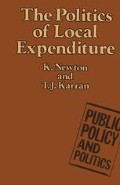Abstract
This final chapter will consider the current state of local finances, concentrating particularly on the topical and highly controversial question of recent government policy. The government has introduced some wide-reaching legislation in the last few years, with still more to come, and in this rapidly changing situation it is not possible to provide a completely up-to-date account of the system. It is also difficult to take a detached view of the particularly heated battle which envelops local government at present. Nevertheless most writers agree that the policies and practices of the Conservative governments elected in 1979 and 1983 introduce profound questions for the future of local democracy in Britain, so some attempt at an assessment of the present state of affairs should be made.
Preview
Unable to display preview. Download preview PDF.
Notes and References
For a fuller discussion of cash limits see N.P. Hepworth, The Finance of Local Government, revised 5th edn (London: Allen & Unwin, 1979), 41–2.
See especially W.A. Robson, Local Government in Crisis, 2nd revised edn (London: Allen & Unwin, 1968).
Report of the Committee of Inquiry into Local Government Finance (Layfield Committee), Cmnd 6453 (London: HMSO, 1976).
On this development see H. Wolman, ‘Understanding local government responses to fiscal pressure: a cross national analysis’, Journal of Public Policy, III, 3 (August 1983), 245–64
R. Greenwood, ‘Fiscal pressure and local government in England and Wales’, in C. Hood and M. Wright (eds), Big Government in Hard Times (Oxford: Martin Robertson, 1981), 85–6.
P. Self, ‘Rescuing local government’, The Political Quarterly, 53 (July–September 1982), 292.
For a detailed discussion of the metropolitan counties see S. Bristow, D. Kermode and M. Mannin (eds), The Redundant Counties? (Ormskirk, Lancs: G.W. and A. Hesketh, 1983)
For an account of both financial and non-financial changes see M. Goldsmith and K. Newton, ‘Central-Local Government relations: the irresistible rise of centralised power’, in H. Berrington (ed.), Changes in British Politics (London: Frank Cass, 1984), 216–33.
See R.A.W. Rhodes, ‘Continuity and change in British central-local relations: “The Conservative threat”, 1979–1983’, British Journal of Political Science, 14 (April 1984), 273–4.
See, for example, A. Midwinter, M. Keating and P. Taylor, ‘Excessive and unreasonable: the politics of the Scottish hit lists’, Political Studies, 31 (September 1983), 394–417.
G. Jones and J. Stewart, The Case for Local Government (London: Allen & Unwin, 1983), 3.
R. Pauley, Financial Times (4 August 1980)
T. Travers, ‘The block grant and the recent development of the grant system’, Local Government Studies, 8 (May/June 1982), 12.
For figures and a discussion of local government spending, 1972–83, see R.A.W. Rhodes, The National World of Local Government (London: Allen & Unwin, 1985), ch. 4.
J. Gretton and P. Gilder, ‘Local authority budgets 1982: responding to incentives’, Public Money, 2 (December 1982), 47.
P. Dunleavy and R.A.W. Rhodes, ‘Beyond Whitehall’, in H. Drucker et al. (eds), Developments in British Politics (London: Macmillan, 1984), 128.
See, for example, A. Midwinter, M. Keating and P. Taylor, ‘Current expenditure guidelines in Scotland: a failure of indicative planning’, Local Government Studies, 10 (March/April 1984), 70.
T. Travers, ‘Opposite effect’, Public Money, 1 (May 1982), 6–7.
J. Gibson, ‘Local “Overspending”: Why the Government have only themselves to blame’, Public Money, 3 (December 1983).
R. Jackman, The Rates Bill: A measure of desperation’, The Political Quarterly, 55 (April–June 1984), 169–70.
N.P. Hepworth, The Finance of Local Government (London: Allen & Unwin, 1972), 83.
L.J. Sharpe and K. Newton, Does Politics Matter? The Determinants of Public Policy (Oxford University Press, 1984).
Coopers and Lybrand Associates, Streamlining the Cities (London: Coopers and Lybrand Associates, 1984).
Committee of Inquiry into Local Government Finance (Layfield Committee), Cmnd 6453 (London: HMSO, 1976), 56–7.
See, for example, J. Knott, ‘Stabilization policy, grants-in-aid, and the federal system in Western Germany’, in W.E. Oates (ed.), The Political Economy of Fiscal Federalism (Lexington, Mass.: Lexington, 1977), 75–92.
R. Jackman, ‘Does central government need to control the total of local government spending?’, Local Government Studies, 8 (May/June 1982), 75–90.
P.M. Jackson, ‘The impact of economic theories on local government finance’, Local Government Studies, 8 (January/February 1982), 31–2.
G.A. Almond and S.S. Verba, The Civic Culture (Boston, Mass.: Little, Brown, 1965), 141
Commission of the Constitution, Research Paper no. 7, Devolution and other Aspects of Government: An Attitudes Survey (London: HMSO, 1973), 6
S. Weir, ‘The citizen and the town hall’, New Society, 9 (March 1982), 346.
R. Jowell and C. Airey (eds), British Social Attitudes: The 1984 Report (London: Gower and Social and Community Planning Research, 1984), 29–30.
C. Game, ‘Axeman or Taxman — who is now the more unpopular?’, Local Government Studies, 10 (January/February 1984), 10.
R. Rose, Getting by in three economies: The resources of the official, unofficial and domestic economies, Studies in Public Policy, no. 110 (Glasgow: University of Strathclyde, Centre for the Study of Public Policy, 1983), 13–14.
S. Edgell and V. Duke, ‘Public expenditure cuts in Britain and consumption sectoral cleavages’, International Journal of Urban and Regional Research, VIII, 2 (1984), 177–201
B. Heiser, ‘Testing public attitudes’, Municipal Review, 645 (April 1984), 14–15
G. Hockley and G. Harbour, ‘People’s choice: public spending, taxation and local rates’, Public Money, 1 (March 1982), 11–14
P. Beedle and P. Taylor-Gooby, ‘Ambivalence and Altruism: Public opinion about taxation and welfare’, Policy and Politics, 11 (January 1983), 15–39
R.M. Coughlin, Ideology, Public Opinion and Welfare Policy (Berkeley, Ca: Institute of International Studies, 1980), 129–54.
D.E. Ashford, ‘A Victorian drama: The fiscal subordination of local government’, in D.E. Ashford (ed.), Financing Urban Government in the Welfare State (London: Croom Helm, 1980), 71.
Copyright information
© 1985 K. Newton and T. J. Karran
About this chapter
Cite this chapter
Newton, K., Karran, T.J. (1985). Knee-Capping Local Government. In: The Politics of Local Expenditure. Public Policy and Politics. Palgrave, London. https://doi.org/10.1007/978-1-349-17849-0_8
Download citation
DOI: https://doi.org/10.1007/978-1-349-17849-0_8
Publisher Name: Palgrave, London
Print ISBN: 978-0-333-34427-9
Online ISBN: 978-1-349-17849-0
eBook Packages: Palgrave Economics & Finance CollectionEconomics and Finance (R0)

